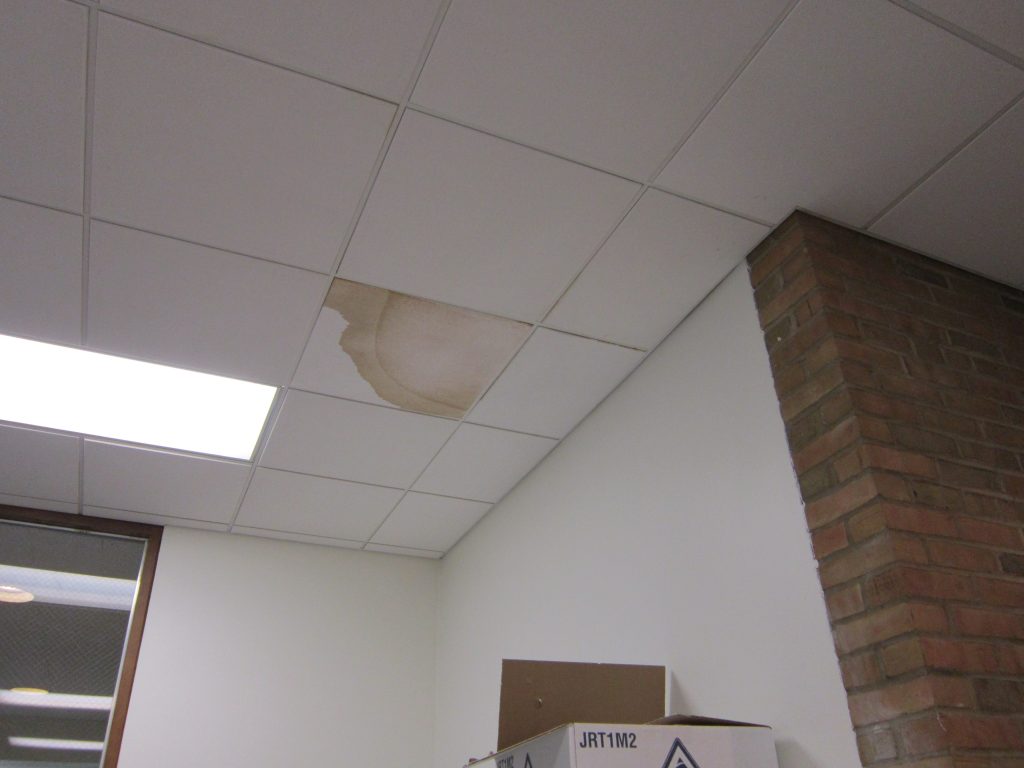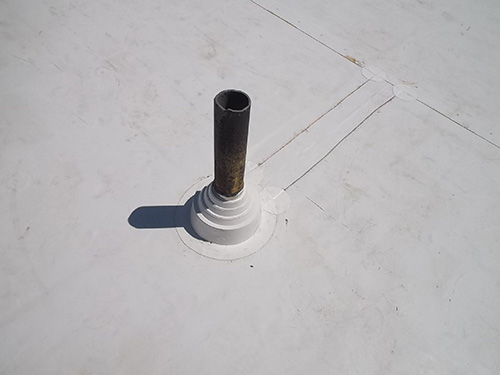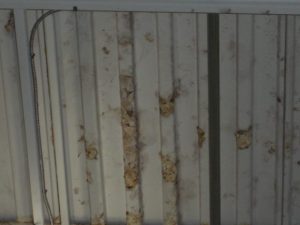Whether installing a new commercial roof or taking care of an existing system, it’s crucial to maintain your roof and address problems.
You may not know your roof has a problem until you see signs inside your building, such as brown spots on your ceiling or puddles on your floor. These are signs that you need to have someone inspect and repair your commercial roof immediately.
Our technicians answer many questions from facility owners and managers. One question we often get is, “What are these brown spots on my ceiling?” That’s why we wrote this article to explain water stains, their dangers, and how to repair your facility.

What Are The Brown Spots on My Ceiling?
When you see brown spots or patches on your ceiling and interior walls, they are water stains caused by a leak above. This leak could be a malfunction in your commercial roof system or a leak with another part of your facility, such as HVAC units or leaking pipes.
5 Common Causes of Water Stains
1. Vents/Skylights
Most commercial roofing systems have accessories like skylights, air vents, plumbing vents, and more. To accommodate these units, your contractor needs to cut their roofing material to fit around them. These areas are not seamless roofing material, so they are vulnerable to leaks through the penetrations. This problem will show when you have stains around vents or skylights, in particular.

2. HVAC Units
HVAC units can cause issues in a few ways:
- Improper installation around the HVAC unit
- Water leaking from the actual HVAC unit (not a roofing problem in this case)
- Water is leaking from the unit on top of the roof, causing problems if it doesn’t drain properly
Whether you call your roofing or HVAC contractor, they should be able to help you narrow down the cause of your HVAC area leak.
3. Leaking Pipe
Sometimes water stains are not caused by a roof issue at all. Leaking pipes in ceilings and walls can slowly drip water until a stain appears in your building. Pipes can be prone to leaks when aged and are constantly enduring extreme temperature changes.
4. Roof Flashing Failure
Flashings are pieces of metal installed on a roof where two areas join together. The purpose of these metal pieces is to prevent water from leaking through the vulnerable area. Since the area underneath is at risk of leaking, keeping your metal flashings in proper working order is essential.
If there’s a failure with your flashings, water may be able to leak not only through your roof, but you’ll often see water stains down walls as well.
5. Damaged or Aged Waterproofing Membrane
The membrane of a commercial roof is the waterproof layer. When the membrane is damaged by weather, foot traffic, mechanical damage, or numerous other situations, water can leak through and saturate the underlying insulation.
Most commercial roofing systems last 15-20 years; this lifespan can vary depending on the type of roof you install on your facility. The older a roof is, the less reliable it can be for leaks. While enrolling in a roof maintenance plan can extend the lifespan of your roof, after a certain number of years, it’s time to replace your roof system.
How to Repair Water Stains
The quicker you respond to your water stain, the better it’ll be repairing it. Your first step is to address the cause of the stain. If you only address the water stain without fixing the cause, it will not only reappear, but it will cause more damage in the long run.
The extent of your repair depends on the amount of damage your facility has sustained. Hopefully, you caught the problem early and took action. Options to repair and clean up water stains include:
- Use a bleach/water solution to blot and wipe the stain away
- After the area dries, if it is still stable, you can directly paint over the area
- Remove the damaged part of the ceiling/ceiling tiles, drywall, and replace them with new, clean sections
- Sand off the damaged layer and seal the area (wood ceiling)
Watch for Mold

If your stains are yellow or green, you may have mold in that area. As mold grows, it becomes darker and more dangerous over time. If you have mold in your facility, you need to take action right away for the safety of everyone in your building. Mold needs to be killed, whether it is a simple bleach/water mix or if you have to call a mold removal company.
Read More: EPA Mold Remediation in Schools and Commercial Buildings Guide
Got brown spots on your ceiling? What are your next steps?
Investing in a commercial roofing project can be a daunting task. But by being prepared and asking the right questions, you can find the right contractor to deliver high-quality work at the right price.
Read More:
- What Happens During a Commercial Roof Inspection?
- What Lies Do Roofing Contractors Tell Building Owners?
- My Commercial Roof is Leaking: What Can I Do?


